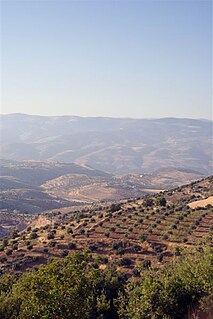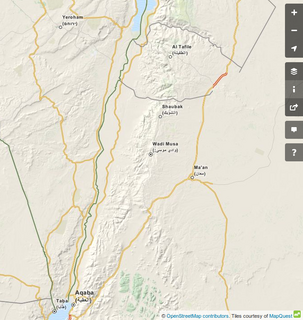
The two Books of Kings, originally a single book, are the eleventh and twelfth books of the Hebrew Bible or Old Testament. They conclude the Deuteronomistic history, a history of Israel also comprising the books of Joshua and Judges and the two Books of Samuel, which biblical commentators believe was written to provide a theological explanation for the destruction of the Kingdom of Judah by Babylon in c. 586 BCE and a foundation for a return from exile. The two books of Kings present a history of ancient Israel and Judah from the death of King David to the release of Jehoiachin from imprisonment in Babylon, a period of some 400 years. Scholars tend to treat the books as made up of a first edition from the late 7th century BCE and a second and final edition from the mid 6th century BCE.
According to the Bible, Admah was one of the five cities of the Vale of Siddim. It was destroyed along with Sodom and Gomorrah. It is supposed by some to be the same as the "Adam" of Joshua 3:16. The location of Admah is unknown. The town is mentioned figuratively in the Biblical, in Deuteronomy and Book of Hosea.
The Wilderness of Sin or Desert of Sin is a geographic area mentioned in the Hebrew Bible as lying between Elim and Mount Sinai. Sin does not refer to sinfulness, but is an untranslated word that would translate as the moon; biblical scholars suspect that the name Sin here refers to the semitic moon-deity Sin, who was worshipped widely around the entire periphery of pre-Islamic Arabia, the Levant, and Mesopotamia.

Gilead or Gilad is the name of three people and two geographic places in the Bible. Gilead may mean hill of testimony. If this the case, it is likely derived from gal‛êd, which in turn comes from gal and ‛êd. There also exists an alternative theory that it means rocky region. It is now within the Kingdom of Jordan.

The Deuteronomist, abbreviated as either Dtr or simply D, is one of the sources identified through source criticism as underlying much of the Hebrew Bible. Seen by most scholars more as a school or movement than a single author, Deuteronomistic material is found in the book of Deuteronomy, in the books of Joshua, Judges, Samuel, and Kings, and also in the book of Jeremiah.

Mount Seir, today known in Arabic as Jibāl ash-Sharāh, is the ancient, as well as biblical, name for a mountainous region stretching between the Dead Sea and the Gulf of Aqaba, demarcating the southeastern border of Edom with Judah. It may also have marked the older historical limit of Egypt in Canaan. A place called "Seir, in the land of Shasu", thought to be near Petra, Jordan, is listed in the temple of Amenhotep III at Soleb.

Tophel or Tofel (תפל) was an Edomite town mentioned in the Hebrew Bible: "These are the words Moses spoke to all Israel in the desert east of the Jordan — that is, in the Arabah — opposite Suph, between Paran and Tophel, Laban, Hazeroth and Dizahab.". It is identified as Tafilah in Jordan north to Petra.

The Ten Commandments, also known as the Decalogue, are a set of biblical principles relating to ethics and worship, which play a fundamental role in Judaism and Christianity. The commandments include instructions to worship only God, to honour one's parents, and to keep the sabbath day holy, as well as prohibitions against idolatry, blasphemy, murder, adultery, theft, dishonesty, and coveting. Different religious groups follow different traditions for interpreting and numbering them.

Sons of the God is a phrase used in the Hebrew Bible and apocrypha. The phrase is also used in Kabbalah where Bene elohim are part of different Jewish angelic hierarchies.
The Desert of Paran or Wilderness of Paran, is a location mentioned in the Hebrew Bible. It is one of the places where the Israelites spent part of their 40 years of wandering after the Exodus, and was also a home to Ishmael, and a place of refuge for David.
Meribah or "Mirabah" is one of the locations which the Torah identifies as having been travelled through by the Israelites, during the Exodus, although the continuous list of visited stations in the Book of Numbers does not mention it. In the Book of Exodus, Meribah is mentioned at the same time as Massah, in a context which suggests that Massah is the same location as Meribah, but other biblical mentions of Massah and Meribah, such as that in the Blessing of Moses, seem to imply that they are distinct.
Abomination is an English term used to translate the Biblical Hebrew terms shiqquts שיקוץ and sheqets שקץ, which are derived from shâqats, or the terms תֹּועֵבָה, tōʻēḇā or to'e'va (noun) or ta'ev (verb). An abomination in English is that which is exceptionally loathsome, hateful, sinful, wicked, or vile.
In the Hebrew Bible, as well as non-Jewish ancient texts from the region, the Northwest Semitic term Rephaite refers either to a people group of greater-than-average height and stature, or to dead ancestors who are residents of the Netherworld.
Shaphan is the name of a scribe or court secretary mentioned several times in the Old Testament.

Mount Horeb, Hebrew: חֹרֵב, Greek in the Septuagint: χωρηβ, Latin in the Vulgate: Horeb, is the mountain at which the book of Deuteronomy in the Hebrew Bible states that the Ten Commandments were given to Moses by God. It is described in two places as הַר הָאֱלֹהִים the "Mountain of God". The mountain is also called the Mountain of YHWH.

The Biblical texts outline sources and legal status of slaves, economic roles of slavery, types of slavery, and debt slavery, which thoroughly explain the institution of slavery in Israel in antiquity. Each section – Exodus 21, Deuteronomy 15, and Leviticus 25 – provides an outlook into the understanding of recent slave relations and gives guidance to the Israelites on how to further their life in a proper manual. Philo, one of the philosophers of the time, wrote texts on how to properly treat slaves, indicating that slavery was an important part of Jewish life, but also emphasizes the humanitarian perspective offered up by many Ancient Near East scholars. One such way of showing this was through the sharing of products, such as food and cloth, with other, underprivileged members of society.

"Thou shalt not make unto thee any graven image" is an abbreviated form of one of the Ten Commandments which, according to the Book of Deuteronomy, were spoken by God to the Israelites and then written on stone tablets by the Finger of God.
Ar is mentioned in the Hebrew Bible several times as a city of ancient Moab. While the exact location is unknown, it is likely to have been in the southern part of the Arnon Valley, which is the present day Wadi Mujib gorge in Jordan. The city was one of Moab's most prominent, being listed by the prophet Isaiah in his denunciation of the Moabite nation. Matthew Poole suggested that "the city was seated in an island in the middle of the river".

"Thou shalt have no other gods before Me" is one of the Ten Commandments found in the Hebrew Bible at Exodus 20:2 and Deuteronomy 5:6, which establishes the nature of the relationship between the nation of Israel and its national god, Yehovah the God of Israel, a covenant initiated by Yahweh after delivering the Israelites from slavery through the plagues of Egypt and the Exodus.









